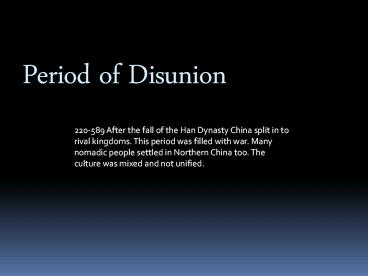Period of Disunion - PowerPoint PPT Presentation
1 / 27
Title:
Period of Disunion
Description:
Period of Disunion 220-589 After the fall of the Han Dynasty China split in to rival kingdoms. This period was filled with war. Many nomadic people settled in ... – PowerPoint PPT presentation
Number of Views:131
Avg rating:3.0/5.0
Title: Period of Disunion
1
Period of Disunion
220-589 After the fall of the Han Dynasty China
split in to rival kingdoms. This period was
filled with war. Many nomadic people settled in
Northern China too. The culture was mixed and not
unified.
2
Sui Dynasty581-618 CE
3
Religion and Culture
- 1.Buddhism spreads from traders and monks that
traveled the silk road form India . - 2. It was welcomed as a way to escape suffering
from earlier disunion. (169) - 3. Many wealthy give money to Buddhist temples
which are architectural wonders. They house huge
statues of Buddha.
4
Technology and Achievements
- The Grand Canal-600 miles that linked Northern
and Southern China transports rice to northern
cities and armies. (167) - 2. Rebuild Great Wall to protect from Northern
invaders.
5
Government and Unification
- Emperor Yang Jian unifies China He restored order
after the Period of Disunion
6
Trade
- The Grand Canal makes trade of food and culture
possible/easier from north to south.
7
Tang Dynasty618-907 CE
8
Religion and Culture
- Late in the Tang dynasty Confucian thought
becomes popular. It teaches a code of behavior.
See Song for more info.
9
Technology and Achievements
- Expanded and Improved Gran Canal
- Great artists paint murals celebrating Buddhism
and sculpt , poetry also become popular
10
Government and Unification
- Empress Wu Ruled with an iron fist in order to
unify China and prevent disunion
11
Trade
- Begin to trade overland with foreigners
- In the west the trade with India and Korea and
Japan in the east. They trade silk, rice spices,
tea and jade.
12
Another Period of DisunionChaos and disorder as
separate kingdoms competed for power. Lasted 53
years.
13
Song Dynasty960-1279
14
Religion and Culture
- Confucius was around 1500 years earlier but,
Confucianism has a resurgence in the Song period.
(177) - Confucius teaches that you should have respect
for others (family, government and education) and
follow appropriate customs and beliefs (behavior
based) (178)
15
Technology and Achievements
- 1.Dragonbone pump scoops water from one place in
order t o dump in canal crop irrigation (170) - 2. Rice grows plentiful in south and wheat and
barley in the north (171)
16
Government and Unification
- A merit system for government jobs-People became
government officials by passing civil service
examinations. If the examination was passed they
become very respected scholarly officials that
work for the government bureaucracy.
17
Trade
- Porcelain is invented and traded with foreigners.
Like with silk, they protect this knowledge to
ensure their ability to trade with foreigners.
18
Yuan Dynasty (Mongols)1279-1368 CE
19
Religion and Culture
- The Mongols were different than the Chinese the
spoke a different language, worshipped different
God, wore different clothing and had different
customs The Chinese thought they were rude and
uncivilized. (181) - 2. Mongols accepted /tolerated Chinese
traditions and philosophies Many adopted Chinese
ways. (182)
20
Technology and Achievements
- 1.With money that Chinese were taxed they build
new roads and palaces (182) - 2. Created a postal system
- 3. built new capital, Dadu (182)
21
Government and Unification
- 1.1211-Genghis Khan-Organized fierce army and
started to attack China in North (180) - 2.1279- Kublai Khan (grandson of G.K.)declares
himself emperor of China. (187) - 3.They heavily taxed the Chinese but allowed them
to keep their own beliefs systems (182)
22
Trade
- 1.Mongols traded be sea and by land which
increased contact with the west - 2.The military protected overland trade routes
making it safe for foreign traders. - 3. Italian merchant Marco Polo who served under
Kublai Khans court He determined that China was
highly civilized.
23
Ming Dynasty1368-1644 CE
24
Religion and Culture
- Buddhism, Daoism and Confucian thought still
influence China
25
Technology and Achievements
- 1.They build the Forbidden City in Beijing. It
has 9000 rooms and government buildings. Only
upper class can go in. (184) - 2. Restoration of The Great Wall they expand it
to over 2000 miles long! (185)
26
Government and Unification
- 1.They expelled the Mongols
- 2. Emperors become powerful.
- 3. Civil Service system is still used
(examinations for government jobs). (186)
27
Trade
- Sailor ZHENG HE- leads many grand voyages all
over Asia and Africa. He returns with over 30
nations representatives to honor the Chinese
king. (183) - 2. Isolationism Ming emperors conclude the west
has little to offer so they restrict trade. (186) - 3.China avoids outside contact and falls behind
other countries in technology and military power
(186)































